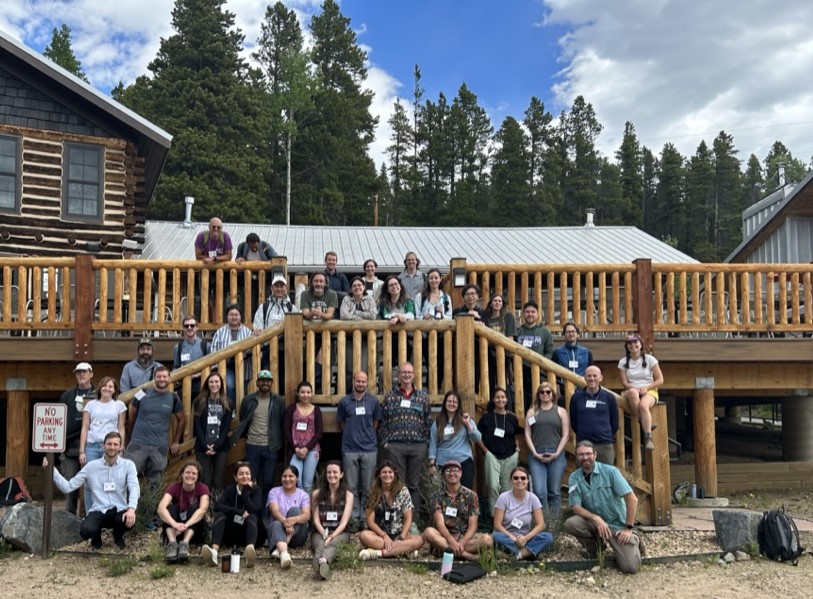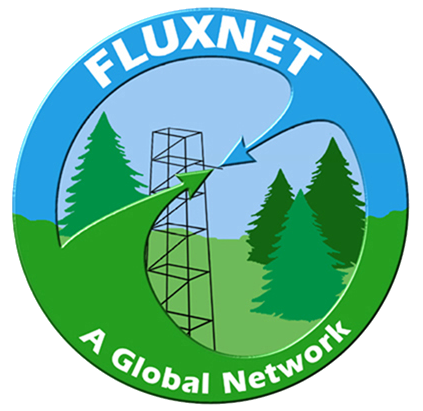
On July 12-15, 40 scientists gathered at the Mountain Research Station near Nederland, CO for the FLUXNET-Coop sponsored “Linking Optical and Energy Fluxes Workshop.” A wide range of disciplines, geographies and career stages were represented, with about ¾ of attendees identifying as early-career. With 11 of the attendees coming from outside of the United States, we sought to build an international community of people working on bridging the gap between flux and remote sensing science. The primary workshop goals were to: 1) Build awareness of existing synergies, challenges and opportunities between remote sensing and flux science; 2) Foster new cross-disciplinary connections to identify and address knowledge gaps and uncertainties associated with both flux and remote sensing data; 3) Increase accessibility, usability, and standardization of remote sensing data so that it can be used to inform flux data, following the FAIR principles.
While flux towers provide critical information on ecosystems and the fluxes of carbon, water, and energy they are subject to uncertainty and not spatially representative globally. By leveraging tower-based remote sensing measurements, we can help to bridge the spatiotemporal gap between fluxes and satellite remote sensing. However, to make tower-based remote sensing data comparable across sites, significant work is needed to standardize data across sites. Challenges with standardizing tower-based remote sensing data include: a wide range of different instruments with different spatial, temporal, and spectral resolutions; uncertainty characterizations; calibrations; data processing, averaging, and retrievals; and data availability. Bringing together scientists working on hyperspectral, SIF, thermal and lidar data, we sought to address these issues and ultimately create a centralized database where end-users could easily access, interpret, and use tower-based remote sensing data to aid in scaling the fluxes of carbon and water to space.
Day 1 focused on hyperspectral and SIF data and consisted of short talks and discussion in the morning, followed by hands-on activities with field spectrometers and data processing. This allowed participants to learn and discuss best practices for collecting and processing field spectroscopy data. Day 2 focused on thermal and lidar data, and included morning talks, discussion, a hands-on activity with thermal cameras and calibrations, and breakout groups to discuss how thermal data can be collected and used at flux towers. Day 3 focused on synergies and modeling, with talks in the morning, breakout groups to discuss best practices for documenting and collecting tower remote sensing data. The workshop ended with a discussion on a path forward to increase collaboration between remote sensing and flux communities across FLUXNET networks. All talks from the workshop have been made publicly available, as well as discussion notes, code and data from the hands-on activities can be found here.
Going forward, we have created several community spaces on both slack and github to keep the conversations going. We have also begun working on a document for best-practices for collecting and processing tower-based remote sensing data, which will eventually turn into a technical paper to help aid in installing, maintaining, and using tower-based remote sensing data. A workshop followup session was presented at the Ecological Society of America meeting on August 8, 2023, and we will have a ‘pod’ at the upcoming American Geophysical Union meeting. Additionally, we submitted a letter on behalf of workshop participants for the “Federal Strategy To Advance Measurement and Monitoring Greenhouse Gas Measurement and Monitoring for the Agriculture and Forest Sectors” – the letter can be found here. Going forward, we will continue with the FLUXNET-Coop subcommittee on data integration for incorporation of remote sensing data. Finally, we are working on a short, EoS style paper discussing why this coordinated network is valuable, what we learned from this workshop, and our plans going forward. Beyond the science, workshop participants enjoyed evening volleyball past sunset, a hike to the US-NR1 flux tower, games, and the joy of living in the mountains for a few days.
For more information on getting involved please contact Zoe Pierrat ([email protected]) or Troy Magney ([email protected]) .
Workshop participants:
Organizers: Zoe Amie Pierrat ,Troy Magney, Anam M. Khan, Loren Albert, Koong Yi, Tommaso Julitta, Will Woodgate, Gilberto Pastorello, Jess Lyons
Attendees: Abdallah Abdelmajeed, Adriana Uscanga Castillo, Aram Kalhori, Ben Runkle, Ben Wiebe, Bill Smith, Charlie Devine, Carlie Southwick, Christopher Still, Eleanor Serocki, Elizabeth Arango Ruda, Erica Edwards, Giulia Tagliabue, Hannah Mast, Jen Diehl, John Gamon, Julia Bigwood, Karem Meza, Kevin Postma, Koen Hufkens, Mallory Barnes, Matthew Dannenberg, Michal Antala, Miriam Johnston, Rachel Badzioch, Rebeca Campos Valverde, Riasad Mahbub, Sergio D. Aguirre-García, Will Richardson, Xinlei Wang, Yujie Liu
